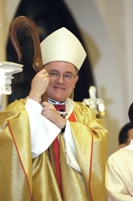Philly’s New Archbishop Doesn’t Like Gay People
Philly’s pedophile priest scandal has been exposed as one of the worst in the nation, quite possibly sending Archbishop Justin Rigali for the hills – or at least retirement. And just when you thought things couldn’t get worse, enter Charles Chaput.
Philly’s new archbishop comes by way of Denver, where he’s long been known for what The New York Times has described as “his aggressive pubic opposition to abortion and same-sex marriage.”
And that may be putting it lightly.
Chaput’s appointment in Philly, while an offense to gay Catholics, also does little to please survivors of sexual abuse. David Clohessy, director of the Survivors Network of Those Abused by Priests (SNAP), called Chaput’s record of fighting abuse “dismal.” Chaput, 66, also opposed legislation that would extend the statute of limitations that a victim can file claims against an abuser. So much for having the victim’s well being in mind.
He’s also been very outspoken politically, namely in the opposition of gays and liberals who support gay rights. In 2004, he scolded Catholics for supporting then-presidential contender John Kerry, saying that a vote for the democratic candidate was akin to “cooperating with evil.” He even encouraged those who voted for Kerry to go to confession. So much for the separation of church and state.
Chaput also discussed political issues in more than a dozen columns he wrote for the diocesan newspaper in Denver – and his archdiocese helped organize voter registration in some of the largest parishes in the state of Colorado. He was also appointed to the United States Commission on International Religious Freedom by the Bush administration (his communications director also worked for the Bush administration, though Chaput claimed he had no prior knowledge of this).
Thanks to many of Chaput’s efforts to crush gay rights – especially gay marriage – by using church doctrine to frighten God-fearing parishioners into supporting a more conservative (read: Republican) agenda, Faith in America had this to say about him and other clergy members like him: “What you and others are espousing is religion-based bigotry – and it is one of the most vile forms of bigotry because of the religious and moral stamp of rejection and condemnation it places on the lives of LGBT people, especially LGBT youth and their families.”
Chaput’s Denver archdiocese also refused to admit the children of a lesbian couple into a Catholic School last year even after Boston’s archdiocese announced that it would accept enrollment of children of gay couples in their parish schools. So much for supporting family.
He’s also criticized clergy, like Bishop Vera Lopez, for ministering to gay Catholics – a move that many believe to be rooted far more in politics than religion as Republicans vie to attract voters from Hispanic communities in Denver and through the Southwest.
And in a column Chaput wrote just this past April, he discusses gays and same-sex marriage – and his opposition to both: “Christians believe in the dignity of all human life, without exception. But the civil unions debate is not about ensuring the basic rights of homosexual persons. Those rights are already guaranteed under law. Nor is it finally about love or personal equality. Civil unions ensure neither of these any better than marriage does.”
He goes on to say that it’s “problematic” that people who oppose gay rights are labeled as “bigots” and “frightened.” He calls that “morally troubling.”
His real argument against civil unions and gay marriage comes down, he says, to procreation – which must really put a damper on heterosexual couples who can’t biologically have children. Because according to Chaput’s logic, they shouldn’t be married either.
“Same-sex unions, whatever legal form they take, cannot create new life,” he says. “They cannot duplicate the love of a man and woman. But they do copy marriage and family and in the process, they compete with and diminish the uniquely important status of both.”
This, Philadelphia, is the man who is now leading the Catholic diocese in the fifth largest city in the country. For the LGBT community, it’s a great disappointment. For others who value basic human rights, it should also be of grave concern.
What do you think of the appointment?



